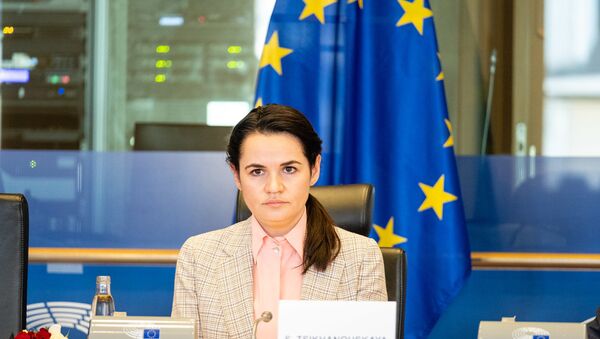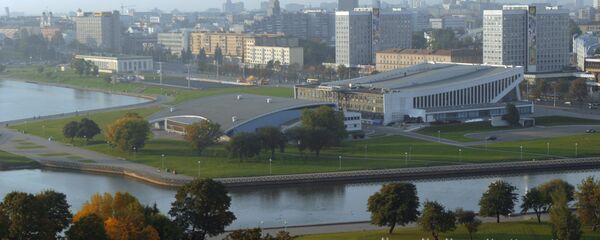The European Parliament selected Belarus’ opposition movement as the winners of 2020’s Sakharov Prize for Freedom of Thought. The European Union’s legislative body specifically singled out a number of people and organisations including Svetlana Tikhanovskaya, whom they refer to as an “opposition leader”.
Kayla Popuchet is minoring in Slavic studies as part of her education in Latin American and Eastern European politics at City University of New York. Ms Popuchet, who is also a regular contributor to Anticonquista and a New York City Housing Court Specialist, says that much of Mrs Tikhanovkaya's image has been constructed by Western governments who do not have the best interests of the Belarusian people at heart.
Sputnik: Who is Svetlana Tikhanovskaya?
Kayla Popuchet: As the tale goes, Svetlana Tikhanovskaya is the wife of Sergei Tikhanovsky, a YouTuber who gained popularity among the youth for criticising the Belarusian government. But the “housewife to President'' dance is a farce, in fact, Tikhanovskaya has always been politically agitated. As a child, she was sent to the Chernobyl Lifeline charity programs, spending her summers in Ireland where she was taught about the “backwardness” of her country and how much “better” the West is. The Ireland Times stated, in a piece on Tikhanovskaya’s connection to Roscrea, that the program “offered them holidays and healthcare”, both of which had already existed in the Soviet Union, and especially in Belarus.
So you have someone who's been told since she was young -- someone who experienced the trauma that was Chernobyl and the dissolution of the USSR -- that the ways of her country are backwards and that the West is advanced and progressive. She is someone taught that the West are the saviours those backwards Easterners desperately need. Though Belarus’ transformation out of the Soviet Union was one of relative stability in comparison to their neighbours, Belarus did experience de-development and an increase in poverty which is something Tikhanovskaya saw throughout her childhood and adolescence, all while she was traveling to Ireland.
Sputnik: What kind of policies and interests does she represent?
Kayla Popuchet: Tikhanovskaya is funded and backed by the same interests that worked to destabilise the Soviet Union and promote neoliberalism all over Eastern Europe. Tikhanovskaya praises the so-called democracy we have in the Western world. In an interview with the Washington Examiner, Tikhanovskaya claimed that the West is free while the East is saturated with crimes against humanity. She later denounced Russian troops that were invited by President [Alexander] Lukashenko to assist in the suppression of the protests.
While her website has since been taken down, it has been archived by Historic.ly’s Esha Krishnaswamy in which you will find a link to the Reanimation Package Reforms for Belarus, the same organisation, that previously drafted market reforms for Ukraine. In it, you will find hyper-privatisation reforms and the underfunding of public services such as hospitals. Tikhanovskaya has vowed to free political prisoners like her husband, political prisoners like Pavel Yukhnevich, Yauhen Afnahel, Aliaksei Karatkou members of the European Belarus Civil Campaign and CEO-developer of the MakreML startup. She has also vowed to move away from the Union-State treaty with Russia and promote foreign investors interests in the Belarusian economy instead. In short, she’s going to sell Belarus out.
Sputnik: What do you think about Mrs Tikhanovskaya being among the recipients for European Parliament’s Freedom of Thought award?
Kayla Popuchet: The Freedom of Thought Award is also known as the Sakharov Prize and when you learn the history of its eponym, you learn that it is quite fitting that she would get this award. Both are political dissidents who betrayed their people, and make no mistake, Tikhanovskaya is a traitor. She is hailed by the imperialists as some sort of hero for advancing their interests. Now what are the concrete, particular stances that showcase Tikhanovskaya’s treachery? Tikhanovskaya has called for sanctions against her country, which we know directly affects the people more so than their leaders.
Sputnik: Do the wider public in Belarus know who Mrs Tikhanovskaya is and the kind of policies she represents?
Kayla Popuchet: Tikhanovskaya is absolutely known all throughout not only Belarus but the world. Prior to the election, Belarus hardly made Western mainstream news. After August 9th, Tikhanovskaya and the opposition had coverage on the front pages of major outlets such as the New York Times. As I’ve already reiterated, her popularity comes from a particular political tendency and class of Belarusians, but not all oppositionists are supportive of her. You will find that there are people who go to the protests solely due to discontent with Lukashenko, but are not convinced that Tikhanovskaya is the answer either. Even leftists like the Belarusian Left Party have gone out to the protests and agitated the protestors, but against the right-wing opposition. While NEXTA gains notoriety, other Telegram channels like ZabastovkaBY have remained critical of the movement and the politics Tikhanovskaya represents. The greater online presence of the anti-Tikhanovskaya sectors remains on VKontakte, while the opposition spreads propaganda on sites more commonly used by Westerners like Twitter.
Sputnik: How popular is she and the opposition movement at large?
Kayla Popuchet: To explain her popularity, we need to be specific in which group does she have popularity with. Is she popular among the older people who lived in the USSR, who remember the effects of WW2 and fascist occupation in Belarus and denounce the Pahonia flag? No.
Translation of first sentence: "Why do I not accept the opposition? In part, because they chose the incorrect symbol. The white and red flag is the flag of the [Nazi] collaborators!" pic.twitter.com/MMWTLJawsN
— Donald Courter (@DonaldCourter) August 19, 2020
Instead she is popular among the IT sectors, the petit-bourgeois youth, and the opportunists like the Belarusian National Front party that have long been fantasising over claiming power of Belarus. Like any group of people, Belarusians are not monolithic and have varying opinions. While she has a lot of supporters, she has a lot of people denouncing her.
On September 17th, in response to the weekly-Sunday opposition women's marches, denouncers of the opposition held "The Women’s Forum: To Belarus", which was organised in an alliance with Lukashenko supporters and those who simply do not support Tikhanovskaya ("To Belarus" has been the pro-government/anti-Tikhanovskaya slogan, whereas the opposition says "long live Belarus"). You will not find in Western media the counter protests held by the pro-Lukashenko sectors, and that is because a narrative needs to be painted that the whole country is unified against Lukashenko. But this is only a carefully crafted picture, not reality.
Another thing is that these protests even have a different way of communicating and organising than grass-roots working class movements. It’s like an art show for young people, they’re organising online and abroad and are unable to effectively capture the rage of the working masses that are discontent with their political status quo. It is ultimately a result of their petit bourgeois nature that is removed from the concerns of workers. But it is imperative to keep a watchful eye on the success of the national strike Tikhanovskaya has called for. It is possible that her legacy will depend on whether or not workers adhere and unify under her call.
Sputnik: The European Parliament also singled out Stepan Putsila who founded Telegram channel NEXTA. What can you tell us about him?
Kayla Popuchet: Stepan Putilo is the 22 year-old activist operating entirely online and outside of his country. In fact, he has been out of his country since he was 18. So for these years, how do you build connections and organise while working specifically online out of the right-wing state that is Poland? Well his audience is largely young people, hopeful for a better future for their country but their issue is that they follow a nationalist. Journalist Armen Gasparyan has claimed that Putilo’s great grandfather was a collaborationist by the name of A.G. Putilo during the 1941 German occupation of the country. This could give us insight as to why Putilo has helped popularize the Pahonia flag as it was the official flag of the nationalist Belarusian People’s Republic in western Belarus and the Belarusian Central Rada, the puppet government of the fascists. He has effectively agitated and coordinated protests all while in the comfort of Warsaw which is also seeing its own wave of protests.
Sputnik: The protests followed the reelection of incumbent president Alexander Lukashenko. There have been accusations that the election was rigged. How seriously do you take these claims and why?
Kayla Popuchet: To be frank, I do believe there was a level of violations during the voting process, to what extent remains unclear. As Sputnik reported, US-backed Zubr ‘Bizon’ and Chestniye Lyudi election monitoring groups both found that President Lukshenko got at least 61.7 per cent of the votes while Tikhanovskaya got 25.4 per cent. Now that isn’t 80 per cent but it also doesn’t suggest that Tikhanovskaya is the president of anything, perhaps in her fantasies for now at least.
Sputnik: To what extent do the recent protests in Belarus represent legitimate grievances against the government of Alexander Lukashenko above and beyond the election result?
Kayla Popuchet: What the opposition is attempting right now is a colour revolution which would not be possible if there weren’t significant grievances from the masses about their government. As I’ve stated in my video with Anticonquista, Belarusian workers have legitimate criticisms, especially that of the work contract system that keeps them binded to their employers. It is parallelld to the pre-labour movement under US capitalism. Another is that I think it is hard to believe that President Lukashenko seriously received 80 per cent of the votes, especially with a turnout of at least 65 per cent, many people feel lied to and betrayed, even if President Lukashenko really did win. But again, the ails of the Belarusian working class will only be devastated further if the right-wing and centre opposition can assume power.
Sputnik: Have the protests consolidated behind any one group or figure?
Kayla Popuchet: Tikhanovskaya surely has become the face of the movement, her story as the doting housewife to political dissident is quite alluring to the naked eye. But she is actually much more ghoulish than the sweet housewife image would have you think. Maria Kolesnikova, the campaign advisor to Viktor Barbariko, and Veronika Tsepkalo, Valery Tsepkalo’s wife, have both supported Tikhanovskaya as their own respective campaigns were ended due to their candidates being arrested while the other fled. The “Belarusian Democracy Movement” or the coalition of various Belarusian oppositionist organisations have supported Tikhanovskaya and campaigned on her behalf. Let’s have a look at one of Tikhanovskaya’s advisors, Franak Viacorka who was the Acting Creative Director for the Minsk bureau for CIA-created Radio Free Europe and sits on the Atlantic Council. His father is Vincuk Viačorka, one of the founders of the right-wing oppositionist party Belarusian National Front, of which whose symbols can be found at protests.
Sputnik: Why do you suppose that is?
Kayla Popuchet: The Belarusian Democracy Movement organisations have rallied behind Tikhanovskaya as her presence is the closest they’ve ever gotten to actually taking power and the worst part is, not many of the youth that protest under their call know what economic policies they have in store for them.
Sputnik: Belarus is not a member of the European Union nor is a NATO member. Can you explain the level of interest that has been taken by the EU and the US in the demonstrations in Belarus?
Kayla Popuchet: The European Union and the United States have had Belarus in their gun slings for decades, this attack on their sovereignty is not novel. The West has funded regime change operations in Belarus for quite some time. The National Endowment for Democracy spent $1,712,398 in 2019 alone while the EU vowed to give 53 million Euros for initiatives that support the opposition in Belarus. Again, prior to the protests, the mentioning of Belarus in Western media was limited to the Russia-Ukraine Brest agreement. While oppositionists claim that Belarus is an authoritarian dictatorship where its citizens have little room for dissidence, the Belarusian government has allowed these Western regime change operations and publications like Radio Free Svoboda and Voice of America to operate in their country. So much for censorship while publications funded by Russian and Latin American governments find themselves censored or disclaimed in the US.
Sputnik: What do you think the political agenda of the European Union is when it comes to Belarus? Is their main concern civil liberties and human rights in a neighbouring country?
Kayla Popuchet: The European Union has no concern for civil liberties and human rights, it is simply a narrative they espouse so that their imperialism can go uncontested. They justify their pillaging of other countries to their own citizens but human rights are never promoted in the countries the United States and the European Union run through. In fact, the opposite happens. The most common but effective example is Belarus’s southern neighbour, Ukraine.
The US-EU alliance in Maidan sought to uplift the neoliberal and 'far-right' alliances in the country to seize power, effectively bringing Ukraine under the surveillance of the West. Leftists organised both for the government and against the government, but their vision for their country was not one with western interests, so they had to be silenced and attacked. And that led to the massacre of at least 48 socialist, trade unionists, and anti-fascists on May 2nd, 2014 in Odessa. A child, 17-year-old Vadim Papura, was among the murdered. And none of the culprits have met justice. On top of that, Ukrainian conditions declined and a war broke out. Both of these factors combined created an exodus of Ukrainians who, despite loving their country, found it difficult to get by. This is the future that the Belarusian opposition wants for Belarus because they are unconcerned for the Belarusian masses, they want to place themselves as the oligarchs of the country.
Prime Minister Angela Merkel and President Milo Đukanović have led their respective countries just as long and longer than President Lukashenko, however only President Lukashenko is declared “Europe’s Last Dictator”. It is because Merkel and Đukanović line up to the EU’s political demands where Lukashenko doesn’t quite cut it. If the European Union was interested in human rights, how does it continue to ignore the crimes against humanity committed by the United States government with detention camps of migrant people and the state-sanctioned violence against Black Americans or perhaps Israel’s siege against Palestinian people? What does the European Union say when US made weapons are used against Colombian protestors or perhaps the French government’s own treatment of the Yellow Vest protestors? To the European Union, only its adversaries commit human rights violations. Instead, what interests them about Belarus is the same as Latin America, Asia, and Africa. They seek to profit from these countries at the expense of their people, on the backs of their people.







